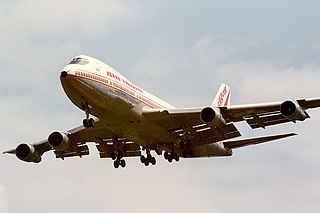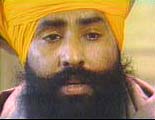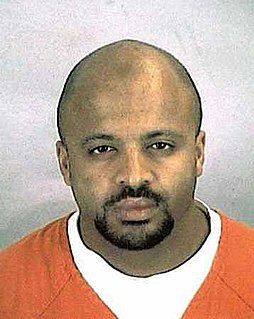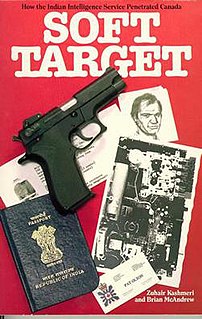The Khalistan movement is a Sikh separatist movement, which seeks to create a separate country called Khalistān in the Punjab region to serve as a homeland for Sikhs. The territorial definition of the proposed country Khalistan consists of both the Punjab, India along with Punjab, Pakistan and includes parts of Haryana, Himachal Pradesh, Jammu and Kashmir, and Rajasthan.

Air India Flight 182 was an Air India flight operating on the Toronto–Montreal–London–Delhi route. On 23 June 1985, the Boeing 747-237B serving the flight disintegrated in midair, at an altitude of 31,000 feet, as a result of the explosion from a bomb planted by Canadian Sikh terrorists. The remnants of the airliner and all aboard fell into the Atlantic Ocean approximately 120 miles West-Southwest of the southwest tip of Ireland, killing all aboard. A total of 329 people were killed, including 268 Canadian citizens, 27 British citizens and 24 Indian citizens. The bombing of Air India Flight 182 is the largest mass killing in Canadian history, and was also the world's most destructive act of aviation terrorism until 9/11.

On or near January 1, 2000, a series of Islamist terrorist attacks linked to al-Qaeda were planned to occur in the context of millennium celebrations, including bombing plots against four tourist sites in Jordan, against the Los Angeles International Airport (LAX) and USS The Sullivans, and the hijacking of Indian Airlines Flight 814. In Lebanon, dozens were killed in clashes in the Dinnieh district between radical Islamists with connections to the Jordan plots and the Lebanese Army. The plots in Jordan and against LAX were foiled by law enforcement agencies, while the attempted bombing of The Sullivans only failed because the boat filled with explosives sank before detonating. The revelation of the plot linked to the LAX "Millennium Bomber" Ahmed Ressam led to unprecedented investigations into possible other terrorist cells in the United States, dubbed Operation "Borderbom", and security measures around millennium celebrations. Other al-Qaeda-linked millennium attack plots may have been planned or foiled around the same time.

Babbar Khalsa International, better known as Babbar Khalsa, is a Sikh militant organisation with objective to create an independent Sikh country Khalistan and uses armed attacks, bombings, kidnappings and murders to accomplish their goals. It operates in Canada, Germany, the United Kingdom and some parts of India. Its headquarters are based in Lahore Pakistan. It is officially banned and designated as an international terrorist organisation by the United States, Canada, the United Kingdom, the European Union, Japan and India.

At 07:13 on Sunday, June 23, 1985 an explosion at the New Tokyo International Airport killed two baggage handlers, and injured four. The bomb was intended for Air India Flight 301, with 177 passengers and crew on board, bound for Don Mueang International Airport in Bangkok, Thailand.

Talwinder Singh Parmar born in Kapurthala, Punjab, India was a Sikh militant and co-founder of Babbar Khalsa involved in the extremist Khalistan movement.
Joseph-Albert Guay was a Canadian mass murderer, who on 9 September 1949, killed 23 people aboard Canadian Pacific Air Lines Flight 108 near Sault-au-Cochon, Quebec using a dynamite time bomb. Guay planted the bomb in the suitcase of his wife, the intended victim, in order to bypass a divorce, obtain life insurance money and elope with his mistress.
Tara Singh Hayer, OBC was an Indo-Canadian newspaper publisher who was murdered after reporting about terrorism and is recognized with provincial and national awards.

Zacarias Moussaoui is a French citizen who pleaded guilty in U.S. federal court to conspiring to kill citizens of the United States as part of the September 11 attacks. As a result of his conviction, he is serving six life sentences without parole at the Federal ADX Supermax prison in Florence, Colorado.
Santokh Singh Bagga was a Canadian Security Intelligence Service (CSIS) informant who helped with the investigation of the 1985 Air India bombing.
The Chittisinghpura massacre refers to the fatal shooting of 35 Sikhs on 20 March 2000, in the Anantnag district of the State of Jammu and Kashmir in India.The Indian government asserts that it was conducted by the Islamic Fundamentalist militant group Lashkar-e-Taiba. Mohammad Suhail Malik of Sialkot, Pakistan confessed while in custody about participating in the attacks at the direction of Lashkar-e-Taiba in an interview with Barry Bearak of The New York Times although Bearak questioned the authenticity of the confession. Suhail Malik is a nephew of Hafiz Muhammad Saeed of Lashkar-e-Taiba. He was however later acquitted of these charges by a Delhi court. Some other observers like Bruce Riedel have also attributed this massacre to Lashkar-e-Taiba.

Soft Target: How the Indian Intelligence Service Penetrated Canada is an investigative journalism work in the form of a book written by two Canadian reporters Zuhair Kashmeri & Brian McAndrew. The authors define Soft Target as "an espionage term used for any country, institution or group of people very easy to penetrate and manipulate for subversive purposes" and argue that the Canadian Sikh community was a "Soft Target" of a covert operation by the Indian government during the 1980s. The book also makes a bold claim that Indian intelligence agencies not only penetrated the Sikh community in order to discredit them world wide and halt the momentum of the demand of an independent Sikhs state, but also manipulated the Royal Canadian Mounted Police (RCMP) and Canadian Security Intelligence Service (CSIS).
The International Sikh Youth Federation (ISYF) is a proscribed organisation that aims to establish an independent homeland for the Sikhs of India in Khalistan. It is banned as a terrorist organisation under Australian, European Union, Japanese, Indian, Canadian and American counter-terrorism legislation. Government of India has declared it a terrorist organisation. While banned, the organization continues to receive financial support from Sikh extremists based in Canada, the United States, and the UK.
Lakhbir Singh Rode is the nephew of Jarnail Singh Bhindranwale, and currently heads the banned International Sikh Youth Federation (ISYF), which has branches in over a dozen countries in western Europe and Canada. Lakhbir is also affiliated with the Khalistan Zindabad Force. He is also known as Lakhbir Singh, Singh Lakhbir Rode, or Singh Lakhbir. He is suspected to be living in Lahore, Pakistan.

World Sikh Organization (WSO) is a non-profit organization whose 1984 founding goal was "to provide an effective, credible voice to represent Sikh interests on the world stage", after Operation Blue Star. Its stated goal is "to promote and protect the interests of the Sikh Diaspora", and "promote and advocate for" human rights. Mukhbir Singh currently serves as President of the organization.
In May 1986, five Canadian Sikhs were charged with plotting to blow up Air India Flight 112 in New York City. Ostensibly members of Babbar Khalsa, two were convicted and given life sentences, while three others were released. However, years later, the courts overturned the sentences and freed the remaining two men noting that the government had failed to disclose "crucial evidence" about the alleged plot, and defence lawyers argued that the men had been entrapped by police agents who invited them to a meeting, then suggested the crime, and arrested them for showing signs of agreement.
Malkiat Singh Sidhu was the former Planning Minister of Punjab, India. He was a member of the Akali Dal political party. In 1986, he was named Minister of State.
Tarsem Singh Purewal was editor for Des Pardes, a Punjabi-language weekly in Gurmukhi script, published in London, UK and aimed at the local Indian community. Purewal was shot and killed, and the murder case remains unsolved.
The Sorrow and the Terror: The Haunting Legacy of the Air India Tragedy is a 1987 book by Clark Blaise and Bharati Mukherjee. It was published by Viking Books. Both authors are naturalized Canadians; Mukherjee is an Indo-Canadian Hindu who was born an Indian citizen while Blaise was born an American citizen.











